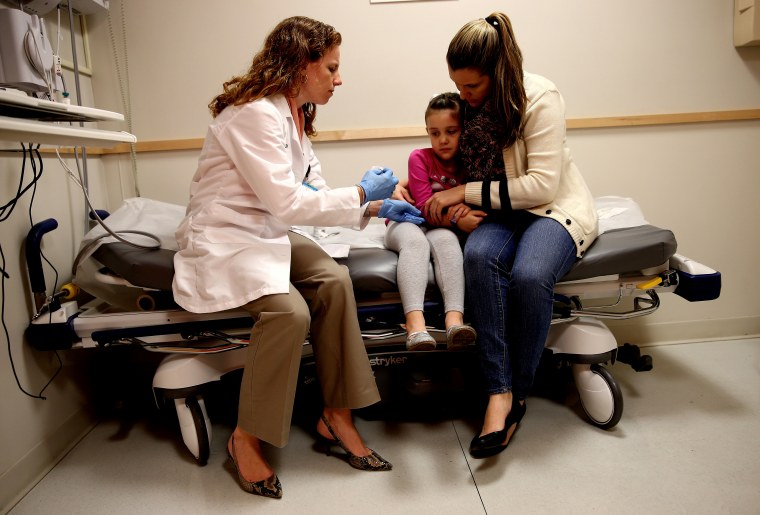The recent measles outbreak in the United States -- fueled in part by parents who refuse to vaccinate their children -- has left dozens infected. Their loved ones are rightly upset over the harm caused by what is known to be an easily preventable disease. Some are demanding justice. Does the law offer a remedy?
"If herd immunity presents an obvious public health benefit, why are vaccination rates not higher?"'
Consider the bigger picture. The Centers for Disease Control and Prevention recommends that all children be vaccinated against the measles between 12 and 15 months of age and again between 4 and 6 years of age. Despite this, data from 2012 indicate that just 91.4% of adolescents nationally between 13 and 17 years of age have been vaccinated.
The higher the rate of vaccination, the less a disease can spread. A very high vaccination rate—above approximately 95%— facilitates herd immunity, which helps contain an outbreak. If herd immunity presents an obvious public health benefit, why are vaccination rates not higher?
The simple answer is that the law offers a way out. All 50 states (and Washington, D.C.) have laws that require proof of vaccination against measles as a prerequisite for children to attend school. So it looks like states encourage herd immunity, right? Yes, but most states provide exemptions from this requirement. Every state rightly carves out an exemption for medical reasons. But almost all states provide exemptions based on religious beliefs and many states provide exemptions based on personal beliefs (sometimes called “philosophical exemptions”).
In practice, it is not difficult to take advantage of these exemptions—there are even “how-to” guides—and state officials rarely scrutinize applications. The public health effects of these easily exploited exemptions can be dire. In California, for instance, personal belief exemptions have been popular, which exacerbates the risks inherent in the current outbreak.
Could the state laws be stronger? Yes, and they should be. As a practical matter, active enforcement of current laws is likely not possible. For religious exemptions, for instance, the U.S. Supreme Court has historically been unwilling to closely examine the nature of religious belief so as not to discriminate against unorthodox or less common belief systems. Instead, the court simply looks to whether the belief is sincerely held, a principle that is reflected in how states treat religious exemptions.
The Supreme Court's caution makes good sense—the First Amendment shouldn't favor more established religions. Yet nothing in the law requires a state to offer a religious exemption. In fact, West Virginia and Mississippi do not have one. Less controversially, states with personal belief exemptions could consider eliminating them. This option is preferable because of the ease and frequency with which this exemption has been exploited to skirt medical fact based on individual (and unfounded) perceptions.
Policy changes are well and good, but they take time -- a luxury unavailable to concerned parents who feel wronged by the carelessness of others' choice not to vaccinate their children. In that case, the law does offer a potential remedy, which my co-authors and I discussed in a 2012 paper: A parent whose child became infected by measles as a result of another child whose parent had chosen not to vaccinate could bring a claim of negligence against the second parent.
There are no guarantees, as we made clear in our argument. Proving negligence requires a duty, a breach of that duty, evidence that the breach caused the harm and, of course, an actual harm and a request for damages (i.e., compensation). We identified very real difficulties in proving causation, and others have rightly pointed out that the courts may be reluctant to impose a duty to vaccinate. Nevertheless, as we contended, there remains a reasonable argument in favor of liability.
Let me be clear—I am by no means advocating that people bring such lawsuits. Such a choice is highly personal, and requires careful consideration of the time, energy, and money involved in going down such a road. More importantly, tort claims like negligence seek to make someone “whole” after being harmed. Tort law offers the prospect of being “made whole” in a financial sense but, with the toll that measles takes on those infected and their loved ones, it offers no guarantees of being “made whole” in a cathartic sense after an intensely personal struggle with the disease.
But the prospect of negligence for the careless choice not to vaccinate highlights a salient point for public health, which often goes overlooked. In public health’s toolbox, preventive measures like vaccination are no doubt its most valuable tool. Although state laws encourage vaccination, they have been weakened by certain exemptions, which hinder their effectiveness. Discussing the prospect of negligence for careless and medically unfounded decisions not to vaccinate, while far from ideal, may be the nudge that is needed to work toward preventing another outbreak.
Nicholas Diamond trained in law and bioethics, and works as a health policy consultant in Washington, D.C.
